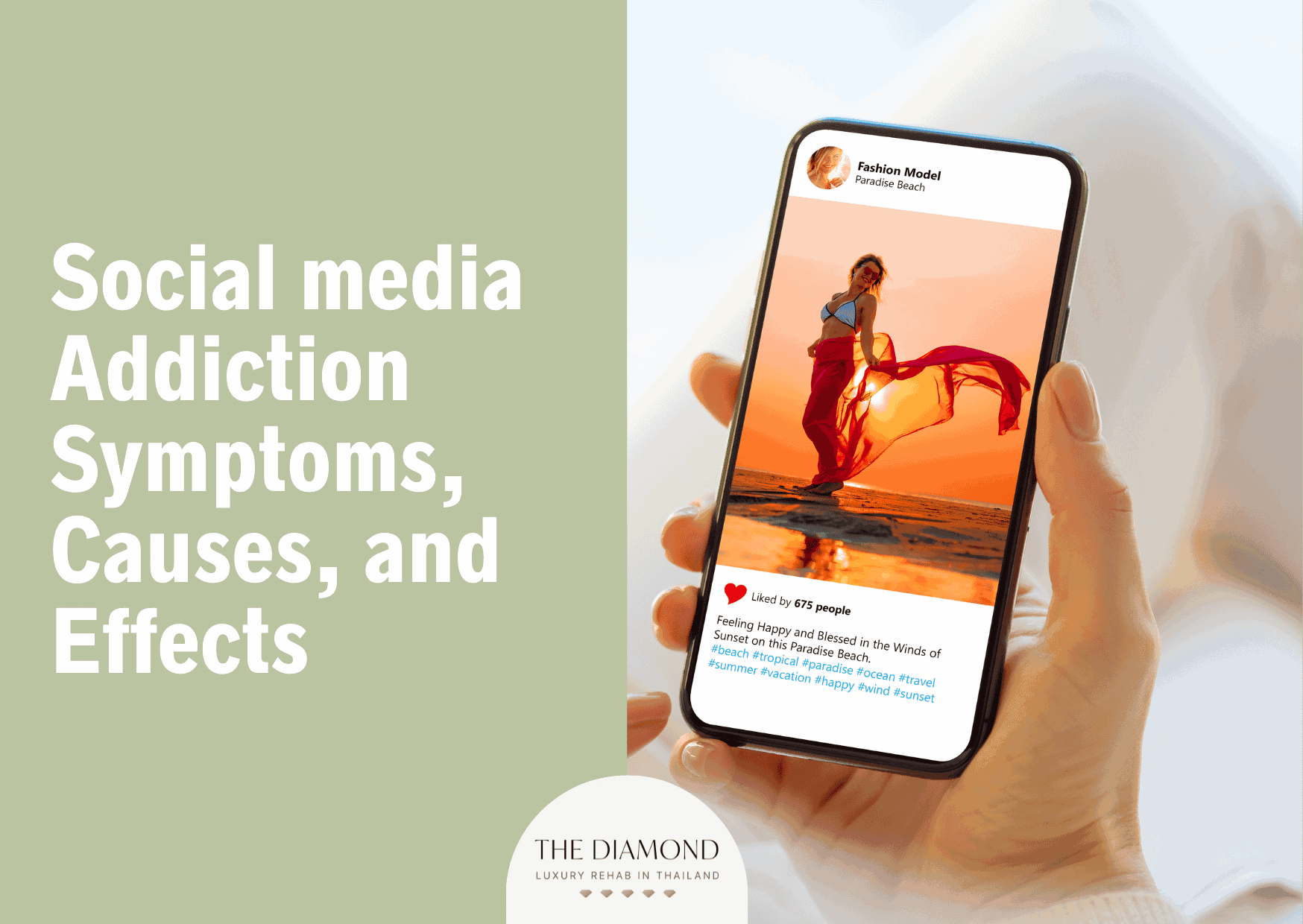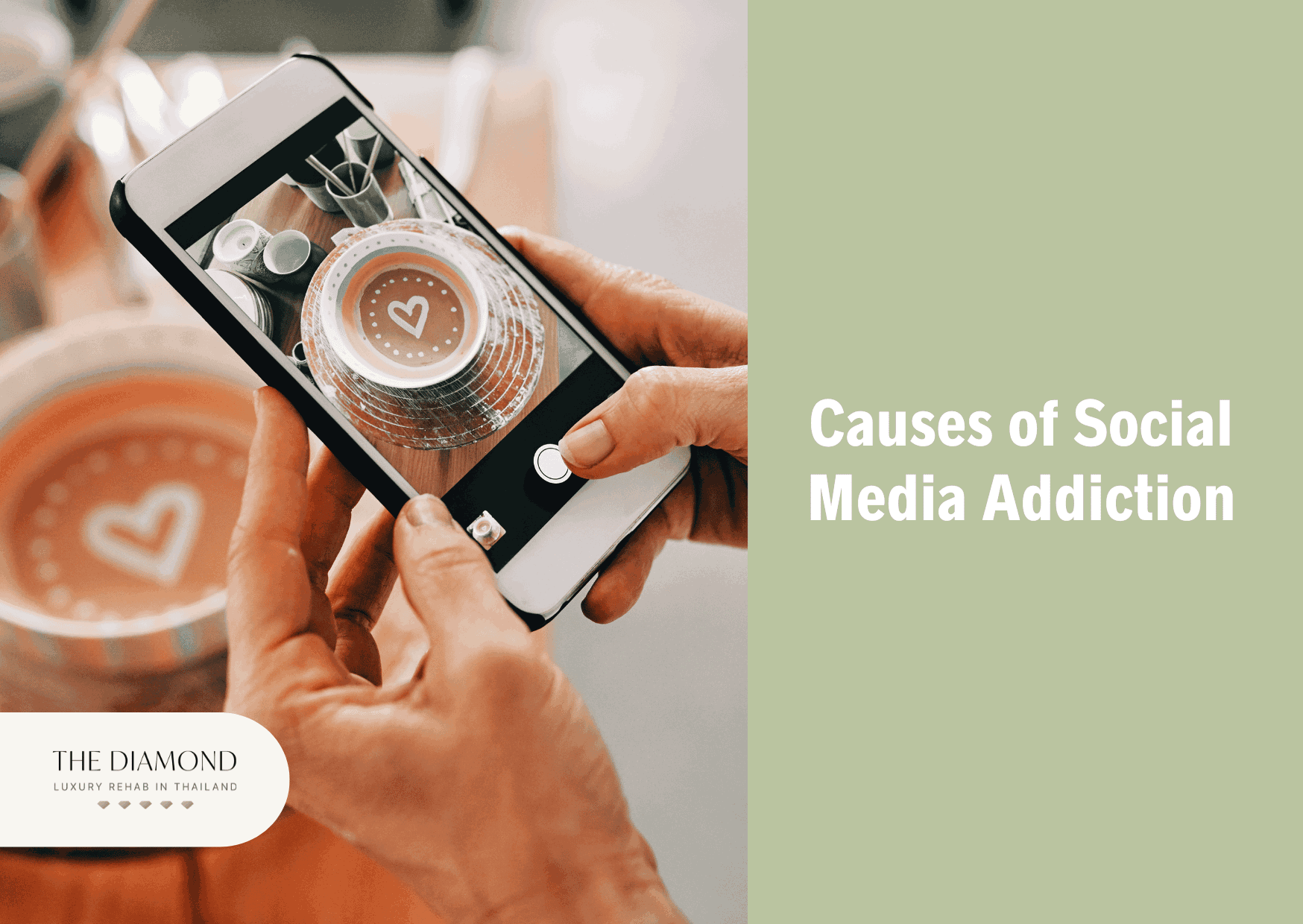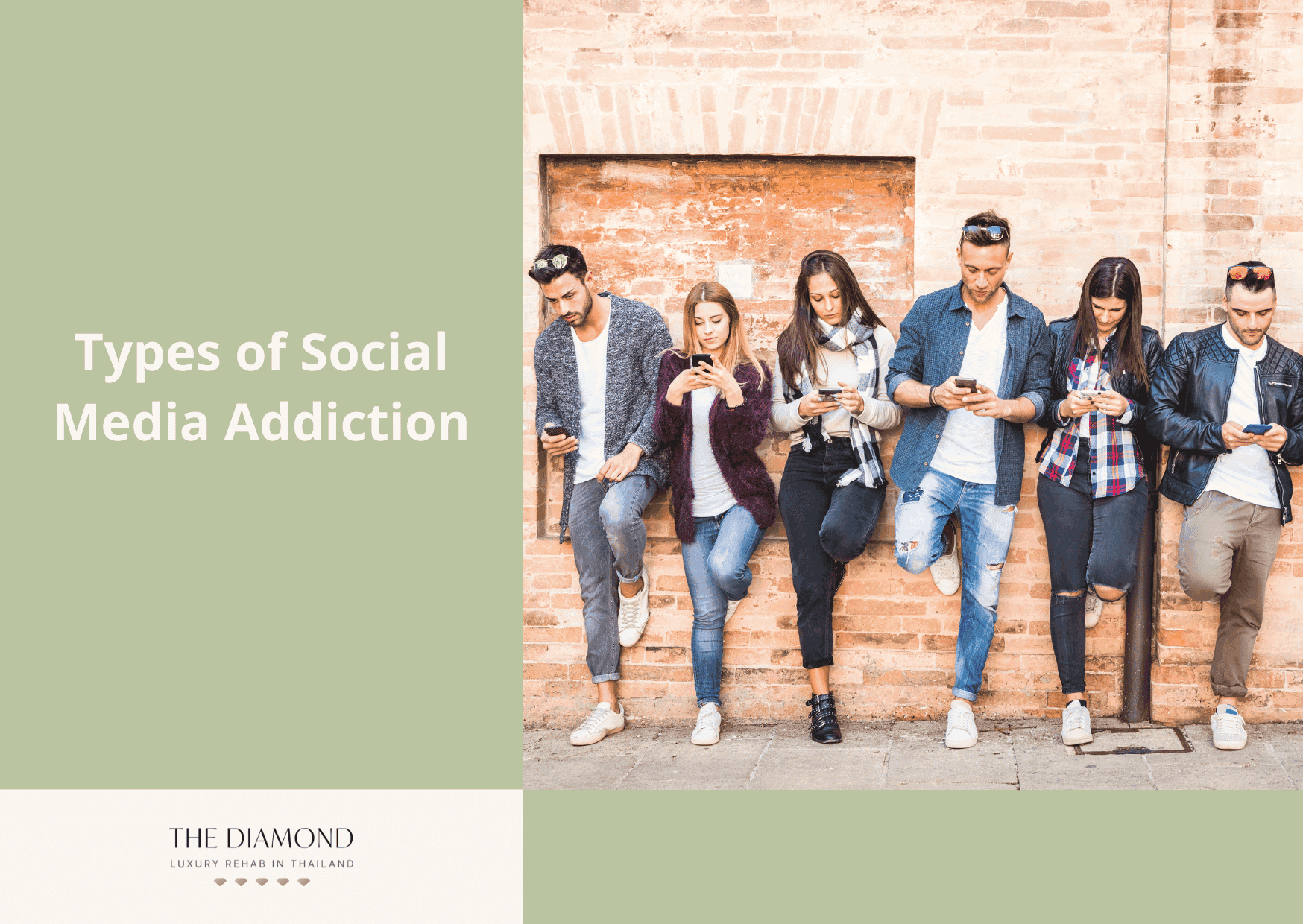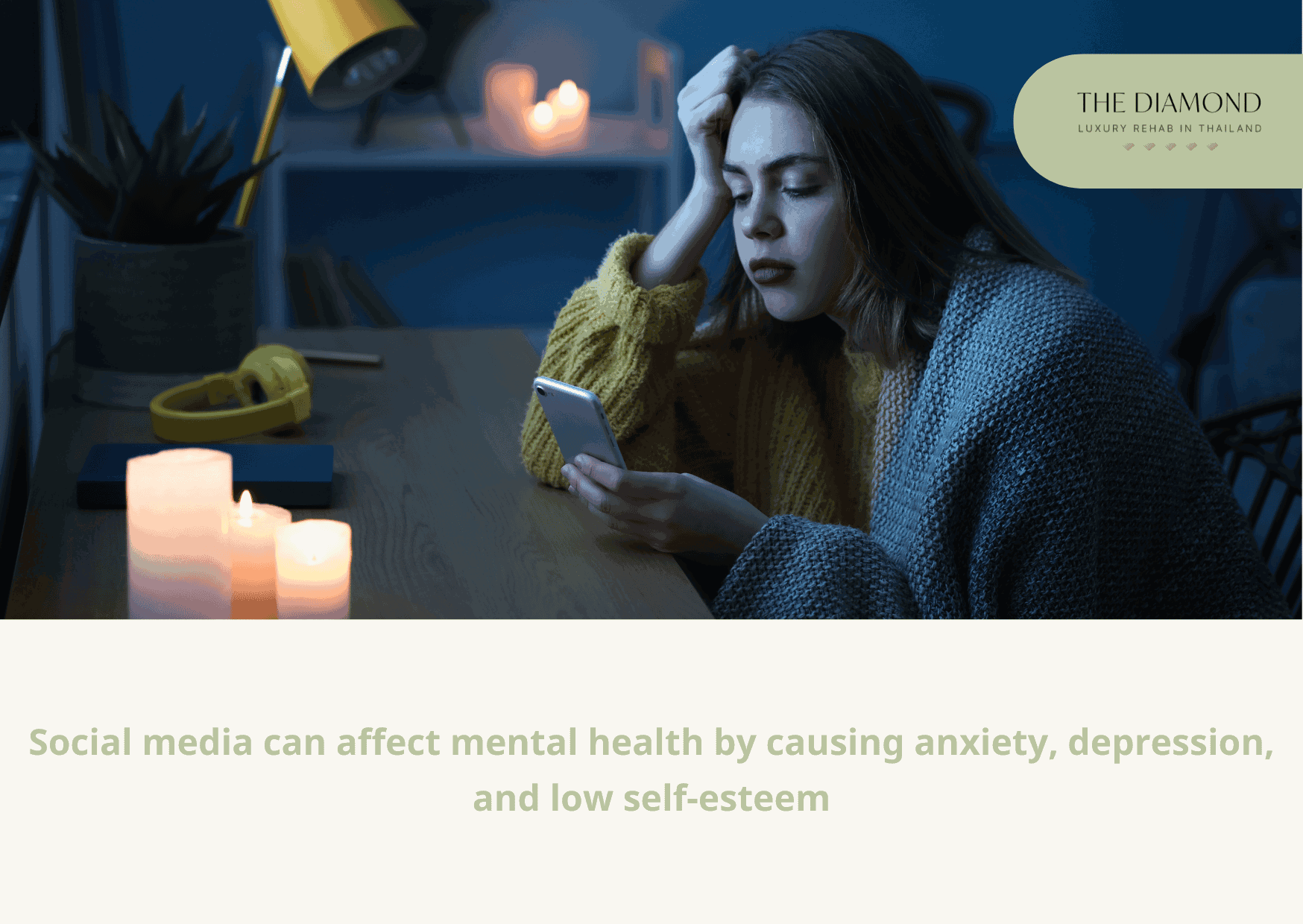Social media addiction symptoms, causes, and effects
Table of content
- What is social media addiction?
- What are the signs and symptoms of social media addiction?
- What are the causes of social media addiction?
- What are the effects of social media addiction?
- What are the types of social media addiction?
- What are the downsides of social media addiction?
- How can social media affect mental health?
- What are the positive aspects of social media?
- What are the negative aspects of social media?
- What are the treatments for social media addiction?

Social media addiction is an addiction in which a person engages in the compulsive and excessive use of social media. Problematic social media use interferes with other aspects of one’s life and can affect a person in several harmful ways.
The symptoms of social media addiction include restlessness if unable to check social media, increased reliance on social media as a coping mechanism, and negative impacts on one’s personal life.
The causes of social media addiction include addictiveness, stress and self-esteem, and social anxiety. These factors drive a person to continue with the excessive use of social media to clear out unpleasant feelings.
The effects of social media addiction include anxiety or depression, increased isolation, decreased physical activity, low self-esteem, and poor work or school performance.
What is social media addiction?
Social media addiction refers to uncontrollable and excessive engagement in social media networking sites and platforms. An individual suffering from social media addiction devotes a significant amount of time and energy to check on social networking sites and engaging with other users on the platforms, as explained by psychologists Daria J. Kuss and Mark D. Griffiths of the Nottingham Trent University in their 2017 paper published in the International Journal of Environmental Research and Public Health.
Problematic social media use is characterized by the inability to minimize or stop excessive social media consumption despite its adverse outcomes and serious consequences.
What are the signs and symptoms of social media addiction?
The most common signs and symptoms of social media addiction are listed below.
- Spending a significant amount of time online: Individuals suffering from social media addiction may prioritize social media use over other important things that become their primary activity, leading to an unhealthy fixation on social media. According to the same 2017 paper published by psychologists Daria J. Kuss and Mark D. Griffiths, this symptom is associated with salience, a characteristic symptom of behavioral addictions.
- Relying on social media as a coping mechanism: A person may increasingly use social media to cope with problems or negative feelings such as boredom, social anxiety, stress, or loneliness. Researchers Vincent Henzel and Anders Håkansson from Lund University in Sweden emphasized in their 2021 paper published in PLOS One that once an individual finds relief from using social media to alleviate distress and tension, it could lead to excessive dependence that may develop as an addiction.
- Feeling restless when unable to check social media: Individuals who struggle with social media addiction may become agitated or troubled when unable to use social media. A person may be aware of the negative feelings that being unable to access social media can cause, but may often feel like the situation is uncontrollable.
- Neglecting school- or work-related responsibilities: As social media continues to consume a big chunk of a person’s time and energy, school- or work-related duties may be neglected.
- Withdrawing from friends and family: Personal relationships may suffer as a social media addict prefers to spend more time in the virtual world. Focusing primarily on social may cause a person to withdraw from family and friends and struggle to be mindful and attentive.
What are the causes of social media addiction?

The most common causes of social media addiction are listed below.
- Addictiveness: The addictive potential of social media can be largely attributed to the novelty that different social media sites offer. Social networking sites and platforms introduce regular updates to engage users to return to the platforms frequently. This makes individuals more vulnerable to compulsive overconsumption of online media. In a 2017 paper published in the International Journal of Environmental Research and Public Health, psychologists Daria J. Kuss and Mark D. Griffiths of Nottingham Trent University highlighted that the addictive aspect of social media, particularly in the form of positive comments, is what interests an individual and ultimately develops a strong desire to follow the current trends and updates online constantly.
- Stress and self-esteem: Social media allows users to selectively showcase life by only selecting the finest moments. It can give a false impression that people must keep up and try harder to live a more desirable life. This can cause stress and lower self-esteem to an individual by putting unnecessary pressure on oneself to do better in life. Additionally, according to the same paper by psychologists Daria J. Kuss and Mark D. Griffiths, individuals with low self-presentation skills use social media platforms in preference over personal interactions. Social media interactions offer a variety of rewards in the form of assurance and satisfaction that may lead to compulsive use to achieve constant gratification online.
- Social anxiety: An inability to establish and maintain real-life relationships can make a person turn to social media, where connections are made more accessible. An individual suffering from social anxiety may prefer to spend time in the virtual world as engaging does not require real-life interactions, as discussed by researchers Alfonso Pellegrino of Chulalongkorn University and Alessandro Stasi and Veera Bhatiasev of Mahidol University in Thailand in a 2022 review article published in Frontiers in Psychiatry.
What are the effects of social media addiction?
The effects of social media addiction and its negative repercussions are listed below.
- Anxiety and depression: The most common negative consequence of social media addiction is anxiety and depression. A 2020 review paper published in Cureus by a team of researchers led by Fazida Karim of the California Institute of Behavioral Neurosciences and Psychology confirms that social media addiction is associated with anxiety and depression. Excessive social media consumption and activity induce fear of missing out on the latest and current trends. Additionally, online reputation, influenced by likes and comments on social media posts, create pressure and stress that contribute to higher levels of anxiety and depression. Individuals who receive negative feedback from social media posts are susceptible to emotional distress that may develop into more serious mental health problems, according to a 2023 paper published in the International Journal of Environmental Research and Public Health by Dr. Hasan Beyari of Umm Al-Qura University in Saudi Arabia.
- Increased isolation: Isolation can either cause people to turn to social media as a preferred means of communication or develop feelings of isolation due to excessive use of social media. In a 2020 paper published in BMC Psychology, professors from different universities in Lebanon, led by Lara Yousse, emphasized the direct link between social media use and loneliness and isolation. Higher levels of social media consumption and use were associated with higher levels of loneliness among social media users. Additionally, spending less time interacting face to face can cause negative mood states like social isolation.
- Decreased physical activity: Excessive social media consumption negatively impacts physical activities and contributes to unhealthy lifestyle patterns. The same paper published by Lara Yousse and her team of professors from Lebanon explains that social media addiction compromises daily life functioning, reduces physical activities, and impairs sleep patterns that result in poor sleep quality.
- Low self-esteem: Loss of self-esteem can stem from comparing oneself with seemingly perfect images of people posted online. Individuals may compare their life and appearance against the idealized representations of social media users. Researchers Alfonso Pellegrino of Chulalongkorn University and Alessandro Stasi and Veera Bhatiasev of Mahidol University in Thailand further explain in their 2022 review article published in Frontiers in Psychiatry that this dynamic may induce feelings of not being good enough and inferiority that undermine one’s sense of worth and confidence.
- Poor work or school performance: One of the most significant signs that social media use is becoming a problem is when it starts negatively affecting a person’s life. Social media addiction can distract students from academic work, while working professionals may lose focus on work-related responsibilities and miss deadlines for important projects.
Why is social media addictive?
Social media is addictive because it activates the reward centers in the brain, a mechanism also seen in substance use disorders.
This process creates pleasurable feelings that can boost a person’s mood when checking social media. For instance, a person with an Instagram addiction can get feelings of pleasure in the form of likes or comments when sharing a piece of content.
This reward circuitry puts individuals at risk of compulsive behaviors around social media use. When a person reencounters a trigger associated with the pleasurable feeling, that person is more likely to engage once more in the addictive behavior, unable to resist the thought of missing something important online.
How social media affect the brain?
Social media affects the brain by activating its reward circuitry and releasing dopamine in the process. Dopamine is a neurotransmitter that creates a feeling of pleasure.
Excitatory synapses in specific brain regions are activated when a social media user receives positive feedback online. This process activates dopamine receptors in the brain’s reward pathways creating pleasurable feelings and rewarding the body. Dr. Anna Lembke, a psychiatry professor, and Chief of the Addiction Medicine Dual Diagnosis Clinic at Stanford University, further explains that repeated exposure and short-term dopamine-feedback mechanisms stimulate a person to use social media more frequently to achieve the same effects. This leads to dependence and, eventually, addiction.

What are the types of social media addiction?
The five types of social media addiction are listed below.
- Facebook addiction: described as the excessive and compulsive use of Facebook to boost one’s mood despite adverse consequences. Problematic Facebook use interferes with a person’s daily life.
- Nomophobia: a shortened form of “no mobile phone phobia,” it describes a condition in which people develop fear and anxiety when left without a mobile device. Having an uncharged phone or being without cellular service can cause panic attacks in some people who suffer from the disorder.
- Instant messaging: the compulsive need for online interactions through instant messaging services like WhatsApp and Facebook Messenger. The disorder involves a preoccupation with instant messaging and may cause a person to check their phone occasionally to see new messages or texts.
- Microblogging: refers to the excessive use of microblogs, a form of traditional blogging that involves short content that can be audio, text, or video. One example of a popular microblogging site is Twitter.
- Online dating: the problematic use of online dating sites and applications. People may prefer forming virtual relationships through dating apps, leading to isolation from family or friends and damage to personal relationships.
What are the downsides of social media addiction?
The downsides of social media addiction are listed below.
- Lack of empathy: A person who struggles with social media addiction often chooses to communicate through email, messaging, or social media rather than face-to-face. The lack of face-to-face communication can influence an individual’s empathy skills, as feeling empathy is best learned through social situations.
- Difficulty sleeping: Excessive use of social media around bedtime can negatively affect sleep quality. The blue light emitted from mobile phones can interfere with the body’s ability to prepare for sleep.
- Fear of missing out (FOMO): Social media creates deep envy of the highlights of other people’s lives. This can result in feelings of missing out on something important that others at present. Several social media addiction facts indicate that FOMO is heavily linked to increased social media usage.
- Loss of interest in activities once enjoyed: As a person devotes a significant amount of time to social media, there is very little time left to do other activities that once brought satisfaction.
- Conflict in real-life relationships: Social media can negatively affect a person’s relationships and expectations of real-life relationships. Leaning too much on alternative modes of communication, such as social media platforms, creates a gap in real-life communication and tends to weaken relationships.
How do you know if you have a social media addiction?
You can suspect having social media addiction if you spend significant time and energy on social media. Another primary indicator of problematic social media use is its negative impact on your life and personal relationships.
When social media use becomes a priority for a person, responsibilities are neglected and real-life relationships are ignored in favor of social media platforms. This interference in daily functioning ultimately leads to a poorer quality of life.
How can you decrease social media use?
The ways to decrease social media use are listed below.
- Move apps away from the home screen and into one folder: Keeping social media apps away from the home screen helps tame the temptation to open apps first thing when using the phone.
- Track online time: Implementing time limits on social media use can help one gain awareness of online media’s impacts on a person’s life. Knowing where a large chunk of a person’s time helps manage social media consumption and improve mindfulness. One effective method is using the screen time feature of smartphone devices that allows users to track and limit the amount of time spent on different social media platforms and applications by restricting access when that limit is reached.
- Turn off notifications for social media accounts: Turning off notifications for specific apps helps reduce distractions and prevents a person from checking social media alerts and notifications. This also allows a person to become more present and mindful.
- Put the phone down before bedtime: Nighttime use of digital devices can interrupt sleep because of the blue light emitted from electronics. Blue light stimulates the brain, which keeps one awake and disrupts sleep patterns.
- Rediscover offline life: Prioritize real-life connections by finding new things to do with family or friends. Doing something that will give a much-needed break from the screen can help one rediscover the benefits of offline life. Distraction is also a practical means to overcome addiction, including social media addiction. According to a 2023 paper by Xiangyu Wu published in SHS Web of Conferences, people can divert their attention from social media by engaging in meaningful activities such as yoga, meditation, hiking, cooking, sketching, reading, writing, exercising, and other healthy activities, and spending time with family and friends.
- Do a digital detox: Practicing digital detox for a few days until a noticeable decrease in social media addiction symptoms may also be an option to overcome this addiction. An individual may safely engage in a digital detox from social media platforms with proactive actions and help from a professional.
How can social media affect mental health?

Social media can affect mental health by causing anxiety, depression, and low self-esteem. Researchers Alfonso Pellegrino of Chulalongkorn University and Alessandro Stasi and Veera Bhatiasev of Mahidol University in Thailand emphasized in their 2022 review article published in Frontiers in Psychiatry the connection between social media addiction and its effects on the psychological and mental health condition. Compulsive and excessive social media use can increase the risk of depression, anxiety, low self-esteem, social isolation, poor sleep quality, and body image dissatisfaction.
Problematic social media use can increase a user’s risk of being bullied online or becoming a cyberbully. People can spread malicious rumors and offensive remarks through different platforms, which can be emotionally scarring and traumatizing. Often, cyberbullies can cause emotional damage while remaining anonymous.
What are the positive aspects of social media?
The positive aspects of social media include staying connected with family and friends worldwide, connecting with like-minded people, and raising awareness about important causes.
The pros of social media are often centered on its ability to connect people and build relationships. Despite its downsides, mindful use of social media can benefit many and help people avoid the various effects of social media addiction.
Building a healthy relationship with social media can allow individuals to use the platform to educate, inspire, foster empathy, and deepen relationships.
What are the negative aspects of social media?
The negative aspects of social media include the risk of addiction, depression, anxiety, feelings of inadequacy about a person’s life or appearance, sleep disturbances, and fear of missing out (FOMO).
The highlights of someone’s life posted on social media cause unrealistic expectations of life, leading a person to feel inadequate. The facade seen online creates an anxious feeling that one is missing out on something exciting or interesting that may already be happening to someone else.
Overusing social media also impacts sleep quality, resulting in decreased productivity and poor concentration.
What are the treatments for social media addiction?
The treatments for social media addiction are listed below.
- Cognitive behavioral therapy (CBT): CBT is a problem-solving approach to social media addiction that aims to teach people methods of managing addictive behaviors that lead to compulsive social media use. In a 2022 article published in the International Journal of Mental Health and Addiction, Qutaiba Agbaria, an academic researcher from Al-Qasemi College in Israel, reports that CBT is considered the most effective approach to reducing excessive internet use, which may also be a similarly beneficial approach for social media addiction.
- Behavioral activation: particularly effective if another mental health condition occurs alongside social media addiction. Behavioral activation encourages individuals to create a sense of meaning, increase pleasurable feelings, and replace unhelpful behaviors.
- Dialectical behavior therapy (DBT): another approach to treating social media addiction that focuses on changing a person’s behavior and encouraging individuals to seek supportive environments to make the journey to sobriety easier. According to a 2020 study led by Dr. Emily Pluhar published in the Journal of Psychiatric Practice, DBT is a potential treatment to address problematic interactive media use, including social media use. It has shown promising outcomes in targeted self-regulation behaviors and decreasing the frequency of interactive media use.
- Family therapy: an ideal intervention option for individuals whose social media obsession affected the rest of the family. Family therapy can help other family members empathize with what the addict is going through.
The treatment options for social media addiction are cognitive behavioral therapy (CBT), behavioral activation, dialectical behavior therapy (DBT), and family therapy.

